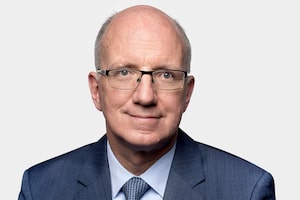Minister of Innovation, Science and Industry Francois-Philippe Champagne at a news conference about an agreement between Canada's major telecom companies, in Vancouver on Sept. 7.DARRYL DYCK/The Canadian Press
The federal government’s long-running scrutiny of Rogers Communications Inc.’s RCI-B-T plans to rewire the telecom sector landscape is raising complaints that Ottawa is entrenching the power of market leaders, rather than meeting its policy goal of enhancing competition.
Rogers’s proposed $26-billion acquisition of Shaw Communications Inc. SJR-B-T, and the related sale of Shaw’s Freedom Mobile cellphone division to Quebecor Inc., face opposition from the federal Competition Bureau. The regulator is attempting to block the deal, alleging it will result in higher cellphone prices.
The telecom companies and bureau are scheduled to argue the case before the Competition Tribunal at a hearing in November. Analysts and industry executives say that while Rogers, Shaw and Quebecor QBR-B-T are likely to win out, the fate of a transaction that was expected to close last spring may take until next summer to decide.
“To date, the only winners in this process are Telus and Bell,” said Shaw chief executive Brad Shaw in an interview. He said the sale of Freedom Mobile to Montreal-based Quebecor will create a cellphone platform with three million customers in Quebec, Ontario, Alberta and British Columbia, fulfilling the government’s policy goal of a strong fourth national wireless company.
There is also frustration in telecom circles over the government’s inability to deliver long-promised regulations for telecom upstarts, known as mobile virtual network operators or MVNOs, which encourage competition by reselling cellphone service on another company’s wireless infrastructure.
“The lack of resolution on the Rogers-Shaw deal and MVNO hasn’t helped smaller competitors in Canada,” said analyst Adam Shine at National Bank Financial in a report on Friday. He said the Competition Bureau’s most recent court filings raised 12 specific “difficulties” with the Rogers-Shaw-Quebecor transactions, many of which the companies said they can remedy. “But the Commissioner has yet to concede on any of them.” Matthew Boswell is the Competition Commissioner.
In response to criticism on the pace of proceedings, the Ottawa-based regulator said it is moving forward quickly, to eliminate uncertainty in markets and stimulate competition. “The Commissioner sought an expedited process given the ongoing harm he has alleged is already occurring in the market,” said Competition Bureau spokesperson Marie-Christine Vézina in an e-mail. “The Commissioner requested an expedited hearing process before the Tribunal in this matter, which was agreed to by Rogers and Shaw.”
Looking ahead, Mr. Shine said if the Competition Bureau loses its case at November’s tribunal hearings, the regulator should avoid appealing the decision. Instead, Mr. Shine said the federal government should “step in and say that it approves the transaction, to bring the process to a belated close, so better clarity could finally prevail in the marketplace and allow parties to move on.”
The Rogers, Shaw and Quebecor transactions must also be approved by federal Industry Minister François-Philippe Champagne. In an e-mail, the minister’s spokesperson, Lauire Bouchard, said: ”As Minister Champagne has previously stated, our government is first and foremost committed to promoting competition and ensuring affordability in the telecommunications sector.”
The best way to reach that goal, according to analysts, is to approve the sale of Freedom Mobile to Quebecor, and the Rogers purchase of Shaw. “Quebecor is positioned to be a more competitive and more sustainable fourth wireless player than Shaw proved to be,” said analyst Tim Casey at BMO Capital Markets in a report. “The lack of a resolution of Freedom’s future is disproportionately favourable to two parties, BCE and Telus.”
The country’s two biggest telecom companies are increasing investments in their networks while cable rivals Rogers, Shaw and Quebecor wait on a regulatory decision. Vancouver-based Telus increased capital spending by 15 per cent to $1.1-billion in the most recent quarter compared with the previous year, while Bell parent BCE Inc. BCE-T said it invested $1.2-billion in the quarter, up 1 per cent from the previous year, “on the continued accelerated rollout of Bell’s pure fibre and wireless 5G networks.”
Since 1986, only six takeovers have been contested at the Competition Tribunal, including the current Rogers-Shaw merger, according to analyst Maher Yaghi at Scotiabank. Of the five that have been reviewed, the bureau won one, partly won a second, and lost three. In a report, Mr. Yaghi said the relative lack of tribunal hearings – one every six years – shows the importance regulators attach to the Rogers deals.
 Andrew Willis
Andrew Willis